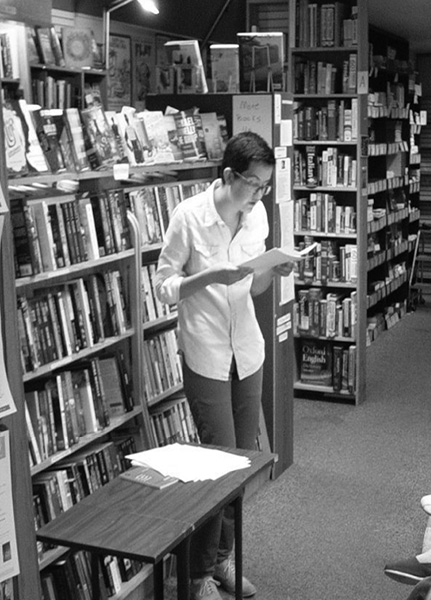
SUNSHINE HONEY
first performed on January 24, 2012
Poetry Collection, University at Buffalo, Buffalo, NY
performed five times in 2012
SARAH DOWLING
Seattle, WA
989860463s989860463a989860463r989860463a989860463h989860463.989860463d989860463o989860463w989860463l989860463i989860463n989860463g9898604631989860463@989860463g989860463m989860463a989860463i989860463l989860463.989860463c989860463o989860463m
SUNSHINE HONEY
SARAH DOWLING
“Sunshine Honey” is a sincere public declamation of pop lyrics. There is no character or persona. Dressed and presented as myself, I relentlessly repeat familiar words and phrases, declarations of love and devotion taken from pop songs that we have all heard before. The recitation speeds up, becomes a little anxious, then fully panicked. But the primary mode of this performance is immersive, not critical. Instead of recontextualizing these song lyrics in order to expose their ridiculous or problematic or exclusive character, “Sunshine Honey” appropriates without derision: what if we were as sincere and as silly as these pop songs? Wait—aren’t we?
I present this public language of love as my private thoughts; I insist that it is, and I worry that I can’t go one better or be any different. In “Sunshine Honey,” I select the most affirmative aspects of this omnipresent junk language (“my girl, my girl, my girl”) and strip them of their musical context, loudly and quickly reciting sincere feelings of eternal love, feelings whose expression is at once poignant and flat. I focus especially on assertions of possession and the ways in which these are linked with happiness, retreat and relief. In this performance, however, there is no respite. Every time fulfillment is presented, it is just as quickly pulled from my longing arms by the forces of contradiction and self-doubt (“I guess you’d say”). If an argument can be extracted from all this emotional tension, it is that wanting and enjoying normal things can be a crucial part of an entirely non-normative project of building a life otherwise: the familiar pop lyrics take on a new form, one that is recognizable but differently expressive.
This performance attends to the sentimentality, repetitivity, sincerity and bathos that characterize everyday paeans to heterosexuality. By running banal song lyrics through queer rhetorics of excess, silliness and camp, I create an overwhelming climate of anxiety. Because queer cultures and politics are currently polarized between demands for inclusion in the status quo and vocal critiques of homonormativity, “Sunshine Honey” takes seriously the desire for normal life, but examines both the production and the effects of that desire. If “Sunshine Honey” is oppositional, then, it is against complacent love.